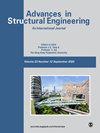Uncertain seismic response and robustness analysis of isolated continuous girder bridges
IF 2.6
4区 工程技术
Q2 CONSTRUCTION & BUILDING TECHNOLOGY
引用次数: 0
Abstract
When calculating the seismic response of structures, conventional methods often neglect uncertainty and suffer from excessive computation. Although robustness metrics have been effective in evaluating structural safety, they are not suitable for isolated continuous girder bridges (ICGB). To address this issue, this paper introduces an uncertain seismic response and robustness assessment method tailored to ICGB: Firstly, the method considers uncertainty in material parameters and ground motion by constructing a data set using Monte Carlo simulation. Secondly, a genetic algorithm for parallel optimisation of radial basis function neural network (GAPO-RBFNN) is trained to predict the seismic responses of the bridges. Thirdly, a robustness metric specifically designed for bridges is derived and applied to bridge. Finally, the proposed robustness metric is validated on lead rubber bearing (LRB) and shape memory alloy-lead rubber bearing (SMA-LRB) bridges. Results indicate that the GAPO-RBFNN model accurately approximates the mapping relationship between structural parameters and seismic response, with an average error of only 0.32% and a 70% reduction in computation time compared with traditional methods. Moreover, the new robustness metric overcomes the limitations of the dismantled member method and is applicable to bridge. The robustness of the SMA-LRB-ICGB, strengthened by SMA, is improved, providing evidence of the effectiveness of the proposed robustness metric.孤立连续梁桥的不确定地震响应和稳健性分析
在计算结构的地震响应时,传统方法通常会忽略不确定性,并存在计算量过大的问题。尽管稳健性指标在评估结构安全方面非常有效,但它们并不适用于孤立连续梁桥(ICGB)。针对这一问题,本文介绍了一种针对 ICGB 的不确定地震响应和鲁棒性评估方法:首先,该方法通过蒙特卡罗模拟构建数据集,考虑了材料参数和地面运动的不确定性。其次,对径向基函数神经网络并行优化遗传算法(GAPO-RBFNN)进行训练,以预测桥梁的地震响应。第三,得出专为桥梁设计的鲁棒性指标,并将其应用于桥梁。最后,在铅橡胶支座(LRB)和形状记忆合金-铅橡胶支座(SMA-LRB)桥梁上验证了所提出的鲁棒性指标。结果表明,GAPO-RBFNN 模型准确地近似了结构参数与地震响应之间的映射关系,与传统方法相比,平均误差仅为 0.32%,计算时间减少了 70%。此外,新的鲁棒性指标克服了拆卸构件法的局限性,适用于桥梁。通过 SMA 加固的 SMA-LRB-ICGB 的鲁棒性得到了改善,证明了所提鲁棒性指标的有效性。
本文章由计算机程序翻译,如有差异,请以英文原文为准。
求助全文
约1分钟内获得全文
求助全文
来源期刊

Advances in Structural Engineering
工程技术-工程:土木
CiteScore
5.00
自引率
11.50%
发文量
230
审稿时长
2.3 months
期刊介绍:
Advances in Structural Engineering was established in 1997 and has become one of the major peer-reviewed journals in the field of structural engineering. To better fulfil the mission of the journal, we have recently decided to launch two new features for the journal: (a) invited review papers providing an in-depth exposition of a topic of significant current interest; (b) short papers reporting truly new technologies in structural engineering.
 求助内容:
求助内容: 应助结果提醒方式:
应助结果提醒方式:


